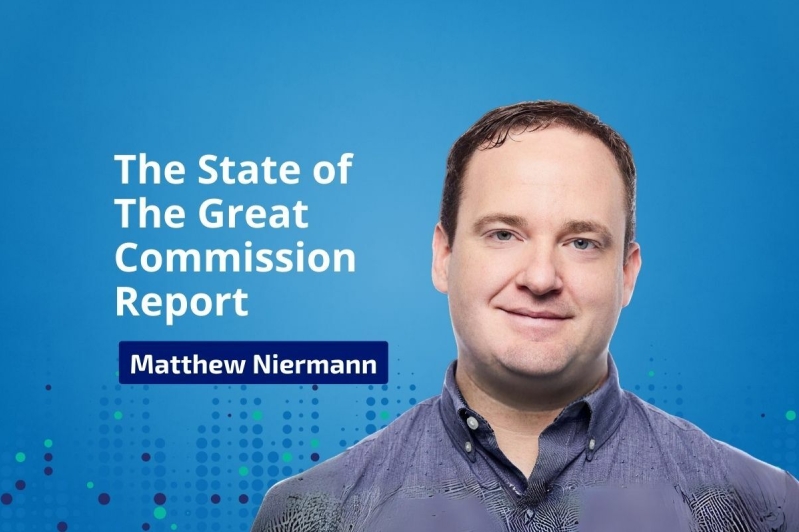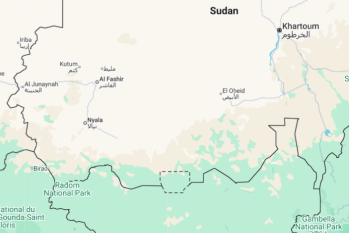
Following the official online launch event this morning at 9am Eastern time, the Lausanne Movement’s State of the Great Commission report is now freely accessible online. More than 800 participants attended the Zoom conference call where executive editor Dr. Matthew Niermann presented some of the highlights of what Lausanne says is an accumulation of the “best global data and key strategic thinkers to understand where the greatest gaps and opportunities are for the Great Commission’s fulfillment.”
A day earlier, Niermann had already provided a few insights during his presentation at the Evangelical Press Association consultation, as reported by Christian Daily International (CDI) yesterday. And following today’s launch, he sat down for an interview with CDI to talk about the research methods, some of the findings that stood out to him most, and what he hopes the report will achieve.
Asked how the researchers went about identifying key issues globally, Niermann explained the process as including two parts: interaction with Christian leaders from every region of the world, and analyzing global data provided by institutions that operate at a global level, including some secular bodies.
“It was a process of emergence and study,” he commented, which meant they conducted “global listening calls for one and a half years with all the regions of the world and all the major issue networks in Lausanne.”
This meant gathering people and asking them, “what are the biggest opportunities and gaps right now? And who are we now talking to and what do we need to think about?”
While this produced a lot of useful information, Niermann said it pointed to many of the same things that they were already aware of. So, they assembled a team of scholars and started to augment the data they had collected by doing literature reviews of both secular data reports and economic reports, as well as Christian literature.
“It was a fifty-fifty kind of development where we found a lot of the gaps that were identified by evangelical leaders and what they are saying, and then also looking at the global data where the world is shifting. And it was in between those two that we were able to identify the issues,” he said.
He pointed to the challenge that there is a lot of data at the national or regional level, but they needed global data. Therefore, they worked with a team of data advisors that helped them identify the most trustworthy sources with the best and most relevant data on each of the issues.
For the surveys they conducted within the Christian sphere, they drew on a pool of 1,500 evangelical leaders from around the world that had previously participated in Lausanne events or initiatives, Niermann explained. This was a convenient approach as they had all gone through a selection process previously where event participants are nominated and vetted to ensure their credibility and alignment with evangelical faith and values as stated in the Lausanne Covenant.
After compiling, reviewing, and editing the data over several years, the report now boasts some over 500 pages including commentaries and analyses by more than 150 global authors. Niermann highlighted the significant effort that went into ensuring diversity and balance of regions and gender, resulting in 35% of authors from the global west, 40% from the global south, and 25% from the global east, with a ratio of 40% women and 60% men.
To make the report more accessible to the general public, a web interface has been launched where users can navigate through various parts of the reports without being overwhelmed by the sheer amount of information. The online approach also allows them to update information as needed over the coming months and years.
Although he encourages Christian leaders to look for the data that relates to their specific interests and ministry, Niermann also recommends looking at the big picture and reading about issues outside of the particular focus area.
And for those who are less avid readers or prefer a more visual presentation, Niermann says they “also produced one hundred pages of graphics for those who may not be as involved in the missions world. They could simply look through the graphics and get a good sense of where we are at in Great Commission.”
Asked about which findings from the report stood out most to him personally, he commented that there are many important issues today. But he believes that there are some that will necessarily lead to a radical shift in the understanding of missions.
He would readily identify two major ones, he said. “Firstly, really grappling with what it means to live in the digital age. We are only fifteen years into the digital revolution, we're just at the beginning of a lot of the technological revolution that is happening. And understanding what that does to missions, to identity, to outreach, to evangelism, to church structures, to all these things, I think we need to think about this very seriously.”
“The next major question, which is really the question of the age, is ‘what is a human being?’” Niermann said, adding that “this is a question that the Church must be prepared to answer, must be prepared to provide a plausible explanation to the people in the pews.”
Due to the complexity of the issues and the many angles that need to be considered, the report’s approach is to work with questions and sub-questions. “It is not only sexuality, gender and identity, but it’s technology, it’s imago Dei, it’s salvation, all these relate to the question of what it means to be human,” he said.
Over the coming few months, another section will be added to the report that features comments that seek to contextualize the findings and questions to different parts of the world.
“The regional reflection will be coming soon and we're beginning to work with certain country-level groups to see how to extend this data and research into their particular context,” Niermann says.
And then looking ahead at Lausanne’s fourth global congress in Seoul, Korea, from September 22-28, he highlighted the collaboration sessions on four afternoons where participants will work in groups discussing how to respond to the mission gaps. “We need to learn, think and grow together in collaboration on these particular issues,” he said.
His personal hope for what the report should accomplish is three-fold. Firstly, he hopes it will help “establish a broad understanding where we are on the Great Commission by the large body of the Church.”
Adding to that, the report should ideally help the Church gain “an understanding of where we are in the present situation, and what the major ways are, in which the world is changing.”
This “knowledge of the world” will help believers better share the gospel, so that it could be “heard by the world.” And the Great Commission efforts “need to respond to, or help shape, the world in these kinds of shifts,” Niermann said, adding that this is why understanding the gaps that the report highlights is so important.
Finally, he emphasized again the report’s approach to the issues with questions. “These are framed as questions for a reason. These are not foregone conclusions. These are being actively shaped as we talk right now,” he said.
Therefore, he would consider it a success, “if the report began to impress upon people that it is not just a response. It is participation in these questions, as these are active questions to shape the future of our world.”





